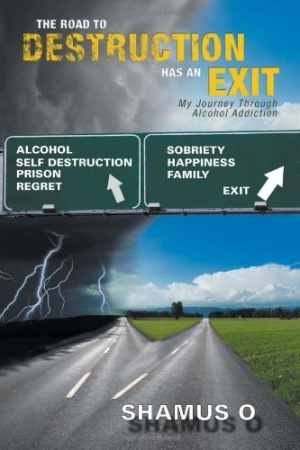The Road to Destruction Has an Exit
My Journey through Alcohol Addiction
Readers looking for hope in this tiny volume of sins may find it, but others could have difficulty taking the stated goals of the author seriously. Though “Shamus O” may be trying to help others—the twelfth step in the Alcoholics Anonymous recovery program—at times he does not seem sufficiently far removed from his disease.
The author omits the details of his harrowing life story and skims over moments when the discussion becomes uncomfortable and requires some soul-searching, so the reader will never know exactly how “O” became sober permanently.
Now in recovery after dozens of slips, O chronicles his failure to conquer his disease openly. Born into privilege and with a sense of entitlement, the author drank his way out of never-ending opportunities in sports, education, family, and career. He managed a modicum of success in a career as an efficiency expert (his efficiency helped hide his alcoholism) and expresses several times that he continues to be unsure of when he “crossed the line.” Only by the fifth charge of driving under the influence of alcohol could everyone agree that the line had been crossed, though O argues that he was nabbed on a technicality. For the author, two years of prison were needed to jolt him into the stark reality of his circumstances.
O’s thoughts often seem to be coming from two different men: the alcoholic he was and the recovering alcoholic he is now. Though he reports that all is going well in his life and marriage after five years of sobriety, he has yet to repair his relationship with his children. Readers only know that the daughter he delivered in a home birth (while drunk) exists, and that O’s son lost a leg to the very machinery he optimized for efficiency. He avoids mentioning the children, and reports that they have avoided him as well. Though he opens his memoir with the suggestion that he cannot catalog specific ways he has hurt his family since only they would know how they have been hurt by him, the fact that he hardly mentions them at all lessens the impact of communicating the lasting effects of his disease with the reader.
The action of the memoir is focused on O’s alcoholism, but a litany of one man’s bad choices is not the best way to promote understanding. The prose, though flawed, is engaging as a story but uncomfortably tragic and rife with inconsistencies. The author avoided jail time for quite a while, yet he feels that the punishment for his fourth DUI “seemed outrageous”—a home-confinement bracelet for one year, fines, and counseling.
O makes statements that seem poignant but receive no deeper discussion. He expresses disapproval over his mother’s alcohol cessation being undertaken without a formal program, saying, “She’s very lonely, bitter, and without dreams or ambition,” then changes the subject.
Stating that he wants to further the education of psychology students and counselors and to offer hope to fellow alcoholics, readers may find aspects of O’s candor noble. Unfortunately, there is very little discussion of what occurred when the author made the decision to recover for good, other than admitting that he bottomed out and found God during that long-due prison sentence. For readers who are alcoholics, the book would be far better if another issue had been addressed: how a man can transform himself from sick to well without prison.
Reviewed by
Carrie Wallace
Disclosure: This article is not an endorsement, but a review. The publisher of this book provided free copies of the book and paid a small fee to have their book reviewed by a professional reviewer. Foreword Reviews and Clarion Reviews make no guarantee that the publisher will receive a positive review. Foreword Magazine, Inc. is disclosing this in accordance with the Federal Trade Commission’s 16 CFR, Part 255.

